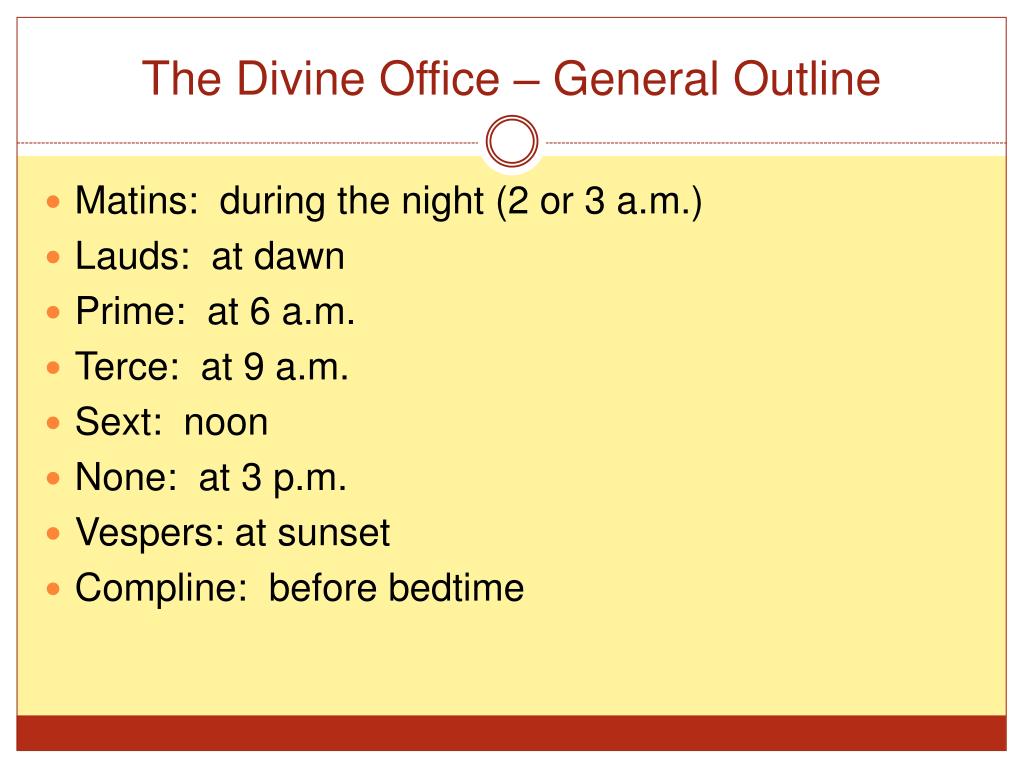
We are using this second Latin edition as the basis of everything that
#THE DIVINE OFFICE MANUAL#
Morning (the hour of Terce) instead of getting up to do their manual work The lazier ones then stayed in bed until nine in the Offices (which corresponded to the more modern Matins and Lauds), the monksĬould retire to rest. The monasteries near Bethlehem, a problem arose, because after the night The manner of its introduction was this: around the year 382, in one of There used to be one more office, Prime, which came between Lauds and Terce. There is nothing magical about the clock. Of course there is nothing to stop you deciding to recite a particular Hour at the same time each day if you want to, but that is entirely up to you. The General Instruction on the Divine Office takes very great care not to specify any. Some web sites give specific times as which the various Hours must be recited. In which case it can be learnt by heart and recited from memory. Simpler by using Compline for Sunday night on every night of the week. Just pick whichever of the three Little Hours seems to correspond best to the time of day, and recite that (§77).Ĭompline (Night Prayer) is designed to be said last thingĪt night, before going to bed, or even in bed (§84). Of course, some people don’t have three suitable breaks, and when one picks just ont Little Hour to recite during the course of the day, the Liturgy gives it the neutral name Prayer during the Day. They are quite short, and intended for use duringīreaks at work (§75). (afternoon) are known collectively as the "Little Hours" (or, more respectably,Īs the Daytime Hours). Terce (mid-morning), Sext (midday) and None As its name implies, the Office of Readings has two long readings in it: one from Scripture You can read more about its history here. Modern reforms have humanized it and made it suitable for any time of day when we are undistracted and able to meditate more deeply on the mysteries of salvation (§55). The Office of Readings originated in monastic communities and was celebrated before Lauds, very early in the morning while it was still dark. Again, the psalms, prayers and intercessions reflect this. As St Basil the Great says, it is for giving thanks for what has been given us during the day, or the things we have done well during it. Prayer) is “celebrated in the evening, when the day is drawing to a close” (§39). Morning Prayer is for when your day begins, so that you are properly prepared for that day. This does not mean that when it is summer you have to recite Lauds at 4.30am, at sunrise, and thus wreck your sleep and your entire day.

The General Instruction on the Liturgy of the Hours says “This Hour, recited as the light of a new day dawns, recalls the resurrection of the Lord Jesus, the true light, enlightening every man” (§38). It prepares us for the day, and its prayers and intercessions reflect this. Lauds (Morning Prayer) is intended to sanctify the morning.

Liturgy of the Hours follows this pattern.įor details of each hour, look at the links on the left.

"Seven times a day I praise you", says Psalm 118(119), and the


 0 kommentar(er)
0 kommentar(er)
